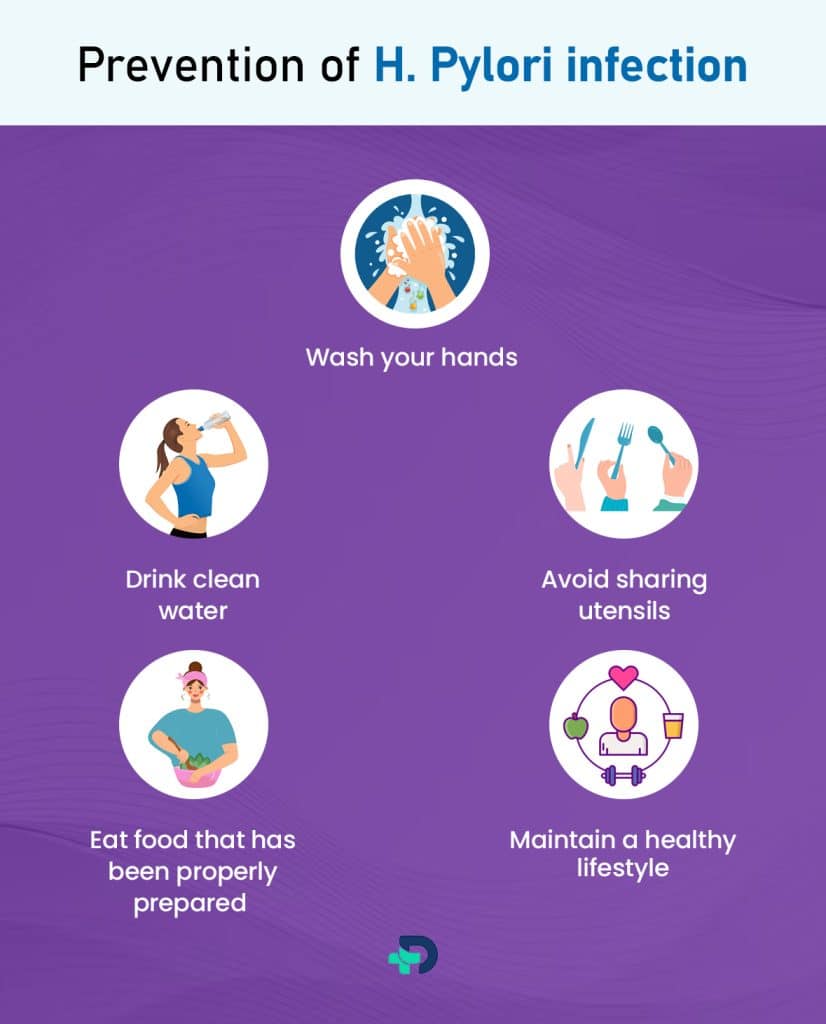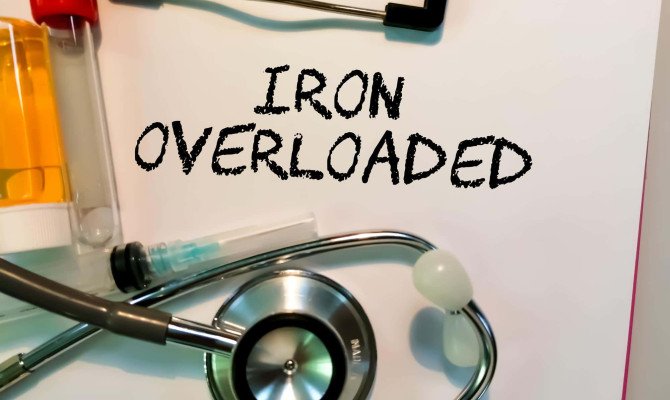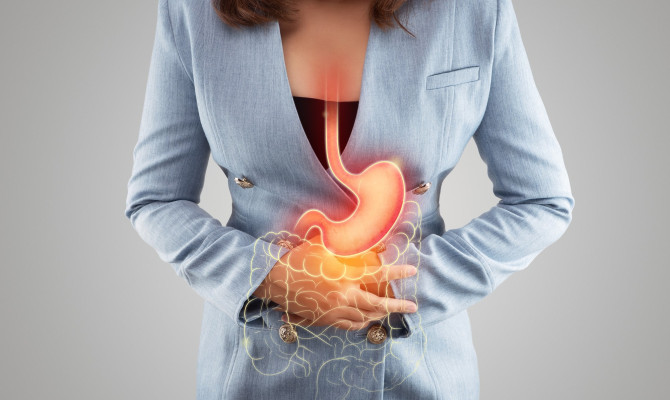H. Pylori Infection : Symptoms, Causes , and Treatment

- H. pylori infection
- 17 Aug 2023
Overview
About H. Pylori infection
H. Pylori, also known as Helicobacter pylori infection, is a common bacterial illness in the stomach and small intestine. Up to 50% of people worldwide may be infected with Helicobacter pylori, a spiral-shaped bacterium that is more common in developing and underdeveloped countries. The H. pylori infection usually begins in childhood and lasts forever without treatment. Although H. pylori infections are typically not harmful, they are the leading cause of stomach and small intestine ulcers.
This article will examine the symptoms, causes, diagnosis, management, complications, prevention, and prognosis of this condition.
Symptoms
Symptoms of H. Pylori
Although many H. pylori-infected people may not show symptoms, the infection can cause several gastrointestinal problems.
The first and common symptoms of H. Pylori infection, however, may include:
- Nausea
- Bloating
- Appetite loss
- Burping frequently
- Unintended weight loss
- Stomach pain or burning, especially with an empty stomach
- Iron deficiency anemia symptoms – extreme fatigue, pale skin, weakness, headaches, inflamed tongue, disorientation, brittle nails, or shortness of breath- are all signs of iron deficiency anemia.1Symptoms| Researched based study from Nlm.nih.gov
- Rarely, an H. Pylori infection might proceed to stomach cancer and cause various symptoms.
H. Pylori cancer symptoms may include:
- Indigestion
- Heartburn
- Appetite loss
- Abdominal pain
- Diarrhea
- Constipation
- Nausea
- Vomiting
- Bloating
- Feeling full (even after eating a tiny amount of food)
- Bloody or unusually dark stools.2Symptoms| Researched based study from Mdanderson.org
Causes
H. pylori infection causes
- The Helicobacter pylori, or H pylori, bacteria are the main cause of H. pylori infection.
- It is thought to be transmitted to others through tainted food, water, or close contact with an affected person.1Causes| Researched based study from Nlm.nih.gov
- In contrast to other bacteria, H. pylori can neutralize stomach acid, enabling it to survive in the stomach’s acidic environment.
Risk
People at risk
People who are have a higher chance of getting infected with H. Pylori include:
- Individuals residing in developing or less developed nations, where crowded and unhygienic living situations may be more prevalent.3Risk| Researched based study from Mayoclinic.org
- Those who live in crowded settings, such as dorms, hostels, overpopulated areas, prisons, etc., are more vulnerable.
- People from lower socioeconomic backgrounds4Risk| Researched based study from Nlm.nih.gov
- Individuals who lack access to a steady source of clean water.
- Those who reside in the same house as an H. pylori patient.
Diagnosis
Diagnosis of H. Pylori
Timely treatment of H. pylori infection depends on accurate diagnosis. Invasive and non-invasive diagnostic techniques include the following:
- Non-invasive methods
- Invasive methods
Non-invasive methods
- The urea breath test – measures how much carbon dioxide is exhaled by a person both before and after ingesting a solution. After consuming the solution, a greater level indicates the presence of H. pylori.5Diagnosis| Researched based study from Clevelandclinic.org
- Stool test – examines a stool sample for H. pylori.
- Blood test – used to assess H pylori antibody levels. When the body’s immune system identifies dangerous substances like bacteria, it produces antibodies, which are proteins.6Diagnosis| Researched based study from Medlineplus.gov
Invasive methods
- Endoscopy with biopsy – The stomach lining can be directly viewed and sampled during endoscopy with biopsy, which yields more precise results.
Treatment
H. Pylori Treatment
The following treatment can eliminate the infection of H. pylori and stop any related complications:
- Antibiotics – such as tetracycline, metronidazole, clarithromycin, and .
- Proton pump inhibitors (PPIs) – include omeprazole, esomeprazole, pantoprazole, and lansoprazole, prevent the stomach from producing acids.7Treatment| Researched based study from Nlm.nih.gov
- H2-blockers – prevent the hormone histamine and lower the stomach’s acid.
- Bismuth subsalicylate – more frequently known by the commercial name Pepto-Bismol, coats the ulcer and shields it from stomach acid.
- Probiotics – when used with other drugs, probiotics can increase therapy efficacy and reduce adverse effects8Treatment| Researched based study from Nlm.nih.gov
To completely eradicate the H. pylori germs, one may require more than one treatment session. The doctor will perform tests a few weeks after therapy to ensure the drug has successfully eliminated the bacteria.
Self-care during H. Pylori treatment
- Smoking should be avoided as it raises the risk of problems, including stomach cancer in people with H pylori infections2Treatment| Researched based study from Mdanderson.org
- Limit alcohol and, if possible, avoid it altogether.
- Keep a healthy weight because extra body fat might exacerbate chronic inflammation.
- Eat probiotic foods to boost the number of healthy bacteria in the stomach and intestines.
- Don’t miss any doses of the medications your doctor has prescribed for you.
Prevention

Prevention of H. Pylori infection
Adopting appropriate hygiene habits and a healthy lifestyle is crucial to preventing H. pylori infection.
Here are some precautions to take:
- Wash your hands – Good hand hygiene helps lower the risk of infection, especially before meals and after accessing the restroom.
- Drink clean water – Be sure it comes from a reliable and safe source.
- Eat food that has been properly prepared – to prevent contamination, ensure you properly cook food and practice good food hygiene.
- Avoid sharing utensils – to avoid spreading the infection, avoid exchanging utensils, glasses, or food with sick people.
- Maintain a healthy lifestyle – Infection with H. pylori can be prevented with a strong immune system. Maintaining a strong immune system can be facilitated by eating a balanced diet, working out frequently, and controlling stress.
Complications
Complications
The capacity of H. Pylori to endure in the hostile acidic environment of the stomach and elude immune system defenses contribute to its recurrence.
H. pylori infection can result in the following complications if not treated:
- Peptic ulcers
- Gastritis
- Stomach cancer 9Complications| Researched based study from Hopkinsmedicine.org
- Recurrent H Pylori infection
Peptic ulcers
- H. pylori frequently causes peptic ulcers, which are ulcers that are open in the inner lining of the stomach or the upper part of the small intestine.
- These ulcers have the potential to be painful, bleed, and possibly make a hole in the stomach or intestine.
Gastritis
- An infection with H. pylori can result in gastritis by inflaming the stomach lining.
- This may cause symptoms like , indigestion, and stomach pain.
Stomach cancer
- Although most H. pylori infections do not result in gastric cancer, the risk can rise with persistent infection with some strains of the bacteria.
- This risk can be decreased with consistent monitoring and proper therapy.
- Gastric MALT lymphoma and adenocarcinoma are both cancers that can be brought on by chronic infection10Complications| Researched based study from Cancer.gov
Recurrent H Pylori infection
- Individuals in developing nations have an increased chance of recurrence of H Pylori infection11Complications| Researched based study from Nlm.nih.gov
Prognosis
Prognosis of H. Pylori infection
Helicobacter pylori infection continues to be a significant global health concern, since it affects millions of individuals and can cause various gastrointestinal problems. Resistance to antibiotics is a major drawback with the treatment of H. Pylori. It can be overcome by adjusting treatment based on individual tests for susceptibility and using other antibiotic combinations. Early identification and effective management are crucial for a good outlook on the infection and may also avoid serious complications. The total disappearance of symptoms can take weeks or months. And people even after recovery, people should practice good hygiene and precautions to prevent a recurrence.
Any feedback on this article?
 This Articles content was accurate
This Articles content was accurate Very Informative Article
Very Informative Article I have a question or a comment
I have a question or a comment
 This article contains inaccurate content
This article contains inaccurate content This article was not helpful
This article was not helpful I have a question or a comment
I have a question or a comment
We appreciate your helpful feedback!
Checkout our social pages
References
-
National Library of Medicine
Helicobacter Pylori | Symptoms
-
The University of Texas MD Anderson Cancer Center
H. pylori and your stomach cancer risk | Symptoms
-
Mayo Clinic
Helicobacter pylori (H. pylori) infection | Risk
-
National Library of Medicine
Prevalence of Helicobacter pylori in Children and Their Family Members in a District in Turkey | Risk
-
Cleveland Clinic
H. Pylori Infection | Diagnosis
-
Medline Plus
Tests for H pylori | Diagnosis
-
National Library of Medicine
Optimizing proton pump inhibitors in Helicobacter pylori treatment: Old and new tricks to improve effectiveness | Treatment
-
National Library of Medicine
Helicobacter pylori treatment: antibiotics or probiotics | Treatment
-
Johns Hopkins Medicine
Helicobacter Pylori | Complications
-
National Cancer Institute
Helicobacter pylori (H. pylori) and Cancer | Complications
-
National Library of Medicine
Recurrence of Helicobacter pylori infection: incidence and influential factors | Complications





































